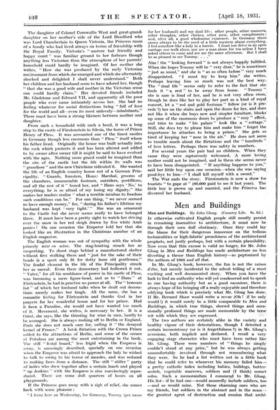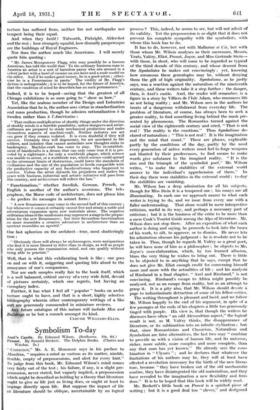Men and Buildings
Men and Buildings. By John Gloag. (Country Life. 8s. 6d.) IF otherwise cultivated English people still mostly persist in remaining insensitive to architecture, it must now be through their own dull obstinacy. Once they could lay the blame for their dangerous innocence on the tedious technicalities or high-falutin' preachiness of the architectural prophets, not justly perhaps, but with a certain plausibility. Now even that thin excuse is valid no longer, for Mr. John Gloag in Men and Buildings has made architecture no less diverting a theme than English history—as peptonized by the authors of 1066 and all that.
In Mr. Gloag's book, however, the fun is not the raison d'etre, but merely incidental to the adroit telling of a most exciting and well documented story. When you have the luck to find an authority who will yet condescend not to speak as one having authority but as a good raconteur, there is always hope of his bringing off a really enjoyable and therefore edifying book which is precisely what Mr. Gloag has done. If Mr. Bernard Shaw would write a revue (Oh ! if he only would !) it would surely be a little comparable to Men and Buildings, in which true things, shrewd things and occa- sionally profound things are made memorable by the terse wit with which they are expressed.
The two authors are certainly alike in the variety and healthy vigour of their detestation, though I detected a certain inconsistency (or is it forgetfulness ?) in Mr. Gloag's aversions, both implicit and declared. I recall a very engaging stage character who must have been rather like Mr. Gloag. There were numbers of " things he simply couldn't stand at any price," but he was always getting uncomfortably involved through not remembering what they were. So he had a list written out in a little book that he could refer to whenever his memory failed him— a pretty catholic index including babies, bulldogs, butter- scotch, vegetable marrows, soldiers and (I think) cornet solos. Such a memorandum I conuneqd to Mr. Gloag. His list—if he had one—would assuredly include soldiers, too —and so would mine. Not those charming ones who are my friends, but soldiers in the abstract and in the mass— the greatest agent of destruction and erosion that arehi- tecture has suffered from, neither fire not earthquake nor tempest being their 'equal.
And when they build ! Tidworth, Pirbright, Aldershot
and the rest ; how strangely squalid, how dismally pauperesque are the buildings of Royal Engineers.
Nor does the author much like Americans. I will merely quote him quoting :
"Mr. James Montgomery Flagg, who may possibly be a famous American, has told the world that To the ordinary liusiness-man in America an artist is a sort of harmless pansy who sits around in a velvet jacket with a bowl of cocaine on one knee and a nude model on the other. And if he makes good money, he is a good artist ; other- wise he is a Pomeranian in pants.' The virility of Mr. Flagg's diction is unforgettable ; it is to be hoped, for the future of America, that the condition of mind he describes has no such permanence."
Indeed, it is to be hoped—seeing that the greatest of all Chicago exhibitions is so soon going to " show us- how."
Yet, like the zealous member of the Design and Industries Association that he is, the author sees virtue in standardization and mass production, though he admires rationalization a /a Sweden rather than a l'Amiricaine: " That endless multiplication of shoddy things under the direction of shoddy minds is a horrible possibility, unless designers and artist- craftsmen are prepared to study mechanical production and make themselves masters of machine-craft. Neither industry nor art can grow if they remain isolated. It is even doubtful if they will survive. Certainly they will degenerate, for art unrelated to life withers, and industry that cannot assimilate new thoughts sinks to bankruptcy. Machine-craft has come to stay. The re-establish- ment of handicrafts is a dream that can only come true if it is pre- ceded by a nightmare ; for only a worldwide plague, which science was unable to arrest, or a worldwide war, which science could spread to the uttermost limits of destruction, could lower the standards of civilization and the size of the population to levels compatible with the productive capacity of any handicraftsmen who happened to survive. Unless the artist discards his prejudices and makes his peace with business, industrial and artistic initiative will pass from this country, and architecture will reflect the loss."
" Functionalism," whether Swedish, German, French, or English is another of the author's aversions. The tele- graphese, the Morse code of architecture, does not please him —he prefers its messages in sonnet form :
" A new Renaissance may come in the second half of this century ; but whenever it comes it certainly cannot live and attain a noble and adventurous expansion upon new materials alone. The negative utilitarian ideas of the modernists may represent a stage in the prepar- ation for the new Renaissance ; but their flavourless functionalism no more resembles a creative adventure in architecture than an aperient resembles an aperitif."
One last aphorism on the architect—true, most shatteringly true :
" Obviously there will always be stylemongers, mere antiquarians who find it is more blessed to delve than to design, as well as people who only possess the examination mind, and can qualify without being able to practise."
Well, that is what this exhilarating book is like ; one goes on and on with it, sniggering and quoting bits aloud to, the annoyance of one's companions.
Nor are such samples really fair to the book itself, which is a well balanced, critical survey of a very wide field, devoid of pictures certainly, which one regrets, but having an exemplary index.
Further, it has what I feel all " popular " books on archi- tecture ought to have, and that is a short, highly selective bibliography wherein other contemporary writings of a like sort are generously commended in miniature reviews.
future catalogue of this nature will include Men and Buids or be but a eunuch amongst its kind.
CLOUGH WILLIAMS-ELLIS.















































 Previous page
Previous page